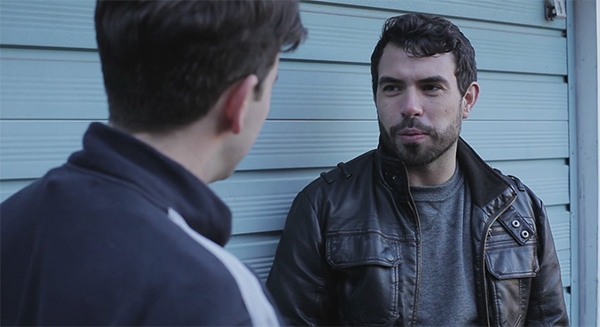In June we're celebrating favorite queer moments in cinema. Here's guest contributor Bill Curran on a pivotal low key scene in Weekend...

Jamie: "What's going on?"
Russell: "Nothing… nothing's going on."
Pride is hard. We’re in a month filled with delirious rainbow floats, umpteen “Yass Queen” gifs, and appropriately lascivious street dancing down many city streets around the globe, and yet I’d like to pause and consider how pride is not merely happiness or acceptance, but respect. And respect is hard.
Respect—one’s own worth in relation to others—is the motoring theme behind much of Andrew Haigh’s Weekend (2011). In this sense, if Weekend can be considered a landmark 21st century film (as indeed it should be, by any number of artistic rubrics), then the pivotal scene is this exchange between Russell (Tom Cullen) and his best (straight) mate Jamie (Jonathan Race). It is the sea change climax before the more expected bittersweet one...
Jamie: "Well, there obviously is. You going to tell me about it or what?"
Russell: "No, I--it feels weird talking to you about it--I don't know. Sorry."
Jamie: "Weird? We're best mates, we talk about all kinds of stuff. Come on…"
There’s so much to love and be moved by in this scene, but first, the context: weekend lovers Russell and Glen (Chris New) said their sleepy goodbyes after an intense, final all-nighter. Russell, considerate to a fault, arrives at his best friend’s house for his goddaughter’s birthday party. He is distracted, disengaged, not unlike his Friday night at Jamie’s at the start of the film. But this time a gutted feeling prevails, a feeling that something is about to pass irrevocably by.
Which makes the cut to this scene against a garage door startling. The self-imposed solitude Russell felt inside breaks with Jamie’s question, and the edit and sound mix into the conversation. Russell’s initial evasiveness is textbook for him, probably his defining trait, lambasted by Glen. Haigh’s direction and Cullen’s performance here are so damn smart: just a single take, non-descript background, Jamie as our point-of-view surrogate, and Russell, locked in a medium shot more focused on his finger sandwich than his friend’s genuine interest.

Russell: "Yeah but we don't talk about this kind of stuff, Jamie. This is not what we do. I've never spoke to you about this kind of stuff."
Jamie: "Yeah, I know."
Russell, it seems, is content to let the day go by and his best friend off the emotional hook once again. Russell will stomach it. His incredible feelings for Glen, and the heartbreak in its wake, are just not the “kind of stuff” he talks about with the only family he has.
Jamie’s “Yeah, I know,” cuts deep. What is this kind of shame? What is this kind of embarrassment that Russell and so many gay men and women feel? Trying to answer this question is something Weekend has been building to the entire film.
Russell: "I don't know Jamie, I don't know, it's… stupid, really. I mean, this guy I've met, Glen… you know, I met him two days ago. He doesn't know me, I don't know him. And he… well, I met him like two days ago. Two days is nothing… I don't know. I feel a bit of a twat, that's all. I think it's just 'cause I'm hung over and tired, and he's going away…"
Jamie: "Oh, you'll see him when he gets back, wouldn't you?"
Russell: "No. No I won't. He's not coming back. He's moving to America, so… that's it."
Jamie: "Well, what time is he leaving?”
Russell: "Doesn't matter."
Jamie: "No, come on, what time is he leaving? I can run you in the car."
Russell: "What about the cake?"
Jamie: "Don't worry about the fucking cake."
Russell: "Cathy will go nuts."
Jamie: "So?
Russell: "Louise is going to want you around. I wanna be here for Louise, it's my goddaughter's birthday."
Jamie: "I'll be half an hour. Come on, I'll run you in the car."

It takes Jamie’s offer for Russell to face his pride and have his train platform moment with Glen. The romantic payoff could not happen otherwise. It is not something Russell realizes alone. It’s an exquisite and symmetrical bit of filmmaking and writing here. We exit the scene as abruptly as we came into it, with Jamie’s final line cut swiftly into Russell walking through the train station.
This is the release Weekend rests on. Nothing dramatically underlined or elevated to grand gesture. As a “gay” film, it is almost sad to realize the quietly radical nature of its most crucial scene: one man asking his friend to say what he means to say. More than a document of a brief encounter, Weekend is about what it means for one’s pride when you can simply, honestly talk.